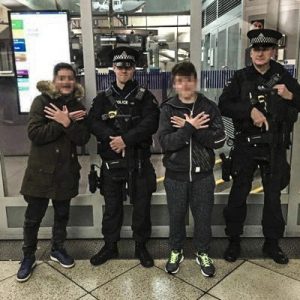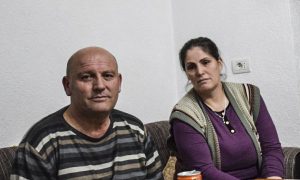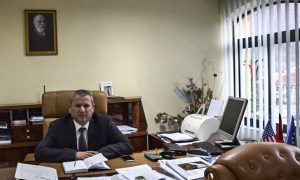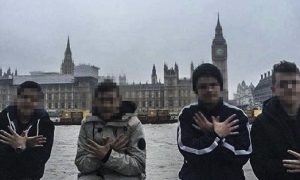Hundreds of trafficked Albanian minors seek asylum in Great Britain, but their hopes for a better future are clouded by real chances of becoming victims of modern slavery.
Enveloped by the dense London fog, four boys at the turn of their childhoods pose in front of the House of Lords with their hands intertwined in the shape of of an eagle.
Behind their backs, on the northern roof of the Gothic-style parliament, rises the famous Big Ben; a witness to the nonplussed gazes and unusual childhoods that these boys from the town of Kruma are living in search of a future in Britain.
To the British authorities, the four boys are part of a hundredfold larger community of unaccompanied asylum-seekers from Albania who, after reaching the land of opportunity with help from human traffickers, risk once again getting caught in their net as a cheap labor force in the black market.
“If my son wanted to, I’d tell him to go.”
About 2,500 kilometers east, in the northeastern Albanian town of Kruma, the lone children of London are the only inspiration for hundreds of others.
“If my son wanted to, I’d tell him to go,” said Flamur Dauti abruptly, giving a quick glance to his son, a ten-year-old who can barely carry his heavy schoolbag with his hands.
“I returned here because that’s the situation I was in back then.”
Dauti, an English teacher and the principal at Skenderbeu Gymnasium in Has, explained that youth emigrate due to lack of opportunities in their homeland, in search for a better future.
According to him, the gymnasium of over 700 students has not seen many leave because the emigration laws favor younger children.
During 1998-99, the area of Has experienced the largest wave of emigration to Great Britain, when its proximity to Kosovo at the time of war gave the inhabitants of this side of the Pashtrik mountain an opportunity to assume a Kosovar identity to escape poverty for a new life.

Albanian minors enjoying taking pictures with British cops. | Photo: Facebook
Almost two decades later, the second generation of emigrants from Has is mostly made up of unaccompanied children and adolescents, who thirst for a new identity sealed on a British passport.
Asylum-seeking children
With fewer than 10 thousand inhabitants, the town of Kruma is the capital of the district of Has, yet the residents humorously say that “their largest municipality is in London.” With the hope of a prosperous life, they settled, one after the other, in Barking – one of the 10 worst neighborhoods according to a study published by the Independent.
Skenderbeu Gymnasium and the primary school across from it constitute the heart of the small town, where movement ceases after school hours as if with the touch of a button. During midday, the number of parked vehicles in the main avenue of the city exceeds that of apartment buildings, but movement is rare. The deserted streets and cafes are the only businesses that flourish with their single sex clientele: boys, men and tobacco smoke.
Data obtained by BIRN at the Regional Education Directorate of Kukes shows high school abandonment, mostly due to emigration. From 2013 to 2016, about 834 pupils from Kukes, Has and Tropoja abandoned their studies.
Fitor Ollomani, coordinator of the Education Directorate at the anti-trafficking center explained that this institution meets the parents of every minor who leaves school and verifies the data through fieldwork.
“The parents informed us that their children left for England or other Western countries,” Ollomani said.
The British embassy in Tirana confirmed to BIRN that from this contingent, a group of more than 400 minors is currently under the institutional care of Great Britain.
“They arrive there through both legal and illegal ways, but remain in Great Britain illegally,” an embassy spokesperson said.
The Home Office of Great Britain reports that unaccompanied children from Albania are the third largest group in the list of asylum-seekers, following Afghanistan and Eritrea. As of March 2016, Albanian minors submitted 425 requests for asylum.
Unlike adults, unaccompanied minors have a higher chance of receiving documents; 73 per cent of applications in 2015 received a positive response on the first review according to the Home Office.
Despite this, child refugees pose an increasing concern for British authorities.
During a visit to the Kukes district in December, the British Ambassador to Albania, Duncan Norma, said that Albanian adolescents risk falling prey to organized crime after they turn 18. He also expressed his opinion that the best solution would be for them to return to their families.
But the solution offered by the ambassador has left Isa Rexha anxious for more than a year.

Isa Rexha and his wife in their apartment in central Kruma. | Photo: Aleksandra Bogdani
A former policeman discharged in 2014, 52-year-old Rexha, with his sturdy physique, slouched his shoulders and could barely get a word out when talking about his youngest son – an asylum seeker in Britain for more than a year and a half.
“My son left to seek a better life since we were not able to offer him a future here. He lives with another family – an English mother who loves him a lot and cares for him well,” Rexha told BIRN.
After turning 15, his son travelled with his uncle to France in October 2015, and then followed the footsteps of others who left before him to England. His parents know that he travelled alone from a train station in Paris to the border region with Britain.
In their apartment in Kruma, the parents explained how their son was thrown on top of other people in the trailer of a truck, and as soon as he reached Britain, he reported to authorities as an unaccompanied child.
“This can only happen here - to have three boys and thank God that they are not in the house.”
For a year and a half, the boy went to high school, took English language courses, and played sports. The only concern, according to his parents, was the negative response he received from the immigration office.
The young boy is not the only one of Rexha’s sons who is trying to build a life outside of Albania. Six years earlier, his oldest son also emigrated. He covers the bulk of financial support for the family, as they do not have any income or funds for the education of the middle son in Tirana.
“This can only happen here – to have three boys and thank God that they are not in the house,” said Rexha with tears in his eyes, making him look like a gentle giant.
The minors’ contacts with human traffickers and the threats they are exposed to after leaving the social support scheme in Great Britain are known to the authorities of the Kukes police, who think that “their trafficking is a complex crime and hard to shed light onto.”
Perlat Vatoci, director of the district police, told BIRN that the complexity of these investigations lies with the fact that no one can be denied the right to travel within the Schengen area, if they are accompanied by parents or carrying a notarized declaration with parental authorization.
“For us as State Police, the illegality starts in France, where they pass the La Manche tunnel to England. Thus, a complex investigation is required,” Vatoci told BIRN.
The investigations carried out by the police show that payments for human traffickers exceed five thousand pounds, but in most cases they are paid by their relatives in Britain, only after the minors arrive there.
The minors report to authorities with a well-rehearsed history as abandoned children who escaped blood feuds or other problems in their country of origin.
“In conjunction with British authorities, we have verified the claims of minors in Britain and they turned out to be false. They are not abandoned children, and the reasons for their emigration were economic,” Vatoci said.
Multiple consequences
Emigration is the strongest pillar for the weak economy of Has – an area that historically sustained itself through agriculture, but today has difficulty finding a market for its products. In Has, a liter of milk costs only 35 Albanian lek (20 cents).
The few workplaces in the city are divided between public administration, while the wave of massive emigration has eroded the institutions’ capabilities to take in qualified specialists.
Kruma Mayor Adem Lala said that most of the families that remain in Hasi survive through remittances.

Adem Lala, the mayor of Kruma. | Photo: Aleksandra Bogdani
The mayor said that emigrants come home with expensive cars, spend money treating others in cafes, and become a magnet for those left in the hometown.
“Even my son who is still in primary school tells me that he wants to go,” the mayor said.
Lala also spoke of his concerns about the long-term development of the area, and that emigration has made the people of Has lazy.
“We have serious problems with finding and employing professionals like engineers or topographers. We could not find workers for the city reconstruction project, so we hired them from Tirana,” he said.
Sami Gjoni, an established veterinarian, does not agree with the mayor because he thinks that the country does not offer a future for his six children.
His son, a distinguished student in his ninth grade class, travelled to Great Britain with a visa and did not return. Gjoni approves of his decision.
“He called me and said: ‘Father, I will not come back,’” Gjoni said. “I would be much more concerned if it weren’t for his uncle that takes care of him.”
With his small shop selling veterinary products and another house in Tirana, Gjoni’s economic situation is considered above average compared to many others in the area. He does not receive financial support from his son.
Gjoni nevertheless hopes that in this endeavor, his son will improve his language skills, get an education, experience a new culture and have an opportunity to build a better future for himself.
“My son dreamed of becoming a plumber, like his uncle, but now he wants to be an engineer. The day he starts school I will celebrate,” he said.
Broken hopes
The illusions back home are often far from the reality experienced by most of the Albanian immigrants in Great Britain. The opportunities to get proper documentation or earn an income are also limited.
Two young men who returned from London, who wanted to remain anonymous, told BIRN that they paid up to seven thousand pounds to achieve their dreams in Great Britain, but their hopes were not fulfilled.
Both travelled illegally to Britain, aided by Indian and Pakistani traffickers, who, according to them, control the human trafficking routes. Both of them spent four years as immigrants, but neither was able to receive proper documentation.
One of the two young men, who is 30 years old now, described how he worked extended hours at a car wash for 50 pounds a day, without having the chance to learn English and integrate into the community.
The second, whose blonde hair was shaved almost to his scalp, said that he had better chances of getting documents because he left when he was a minor and attended a college in London. Despite this, his request for asylum was denied “due to negligence” and he came back to Kruma in 2011.
“There, you can appeal decisions up to 21 years and past that, if you find a good attorney you’ll succeed,” said one of the friends in a cafe in Kruma. “That’s how much I was destined to stay,” he added.
The men said that car washes were the primary workplace for illegal Albanians in Britain. Managed en masse by Albanians, who rent the businesses from Romanians, the car washes guarantee a daily wage of 40-50 pounds for immigrants, who first pay their travel debts and afterwards work for themselves.
Car washes, according to evidence gathered by BIRN, are also the first stop for minors who are refused asylum by the authorities.
“Not long after receiving a negative response, they directly get into illicit business,” explained one of the young men who returned.
British authorities fear that the minors from Albania risk becoming victims of work-related or sexual exploitation or recruitment by organized crime groups.
Another front for exploitation and modern slavery is the construction business.
Children who disappear from the social system constitute an added security concern for British authorities. An investigation by BuzzFeed News, published in the summer of 2015 after requests for information were sent to 130 local authorities in England and Wales, shows that the number of Albanians that disappeared from the radars of social services doubled between 2014 and 2015.
British authorities fear that the minors from Albania risk becoming victims of work-related or sexual exploitation or recruitment by organized crime groups.
This concern is supported by periodic reports from the National Crime Agency: Albanians, both minors and adults, top the lists of people who are referred to as victims of modern slavery in the central and local authorities of Great Britain.
According to the National Referral Mechanism, a system for identifying victims of trafficking and slavery in Great Britain, 147 Albanians were identified from July to September 2016, among which 101 were adults and 46 were minors. Albanians are the second most reported group for different types of exploitation after Vietnamese people.
In Kruma, the evidence gathered by BIRN shows that such concern is exaggerated and part of efforts for Albanians to receive proper documents.

Four asylum seeking children from Has region pose in front of the House of Lords in London. | Photo: Facebook.
Being a small place where news spreads like wildfire, the residents insist that no one from the Has area has ever had problems in England, and that the lack of opportunities is abated by the codes of the tradition of support and help for one another.
The collective conscious nevertheless accepts passing minors through the hands of human traffickers multiple times, working extended hours–illicitly and without any assurance–and life amidst the risks of suburban ghettos as normal.
“There I learned not to trust anyone, because every dramatic event was used as an excuse to get asylum,” one of the young men who returned told BIRN.
“Girls would report you for sexual harassment for nothing, while men would accuse you of aggression, because by shoving one another under the bus, they increased their own chances [to get asylum],” he said.
After the experiences in Great Britain, the youngster emigrated to Switzerland and France for a short time. Canada is his new objective. He said that he is not able to find himself in his hometown and does not see any other solution for himself, except to become a “certified emigrant.”
“You never stop trying,” he said with a thick accent. “I will never stop trying!”
This article was originally published in Albanian on February 15, 2017.





